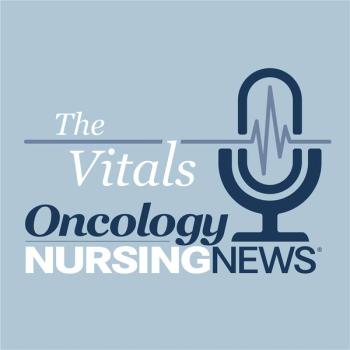
Music can help alleviate stress and bring something familiar into an unfamiliar medical procedure.

Music can help alleviate stress and bring something familiar into an unfamiliar medical procedure.

Smoking cessation has major benefits – even after a patient received a diagnosis of cancer.

Sotorasib is the first targeted therapy approved for KRAS-mutant non-small cell lung cancer.

From medical information cards to visual cues, a nurse navigator offers advice on ensuring quality care for patients who do not speak English.

Oncology advanced practice registered nurses are key players in the mitigation, preparation, response, and recovery of a public health disaster, such as the COVID-19 pandemic.

The pandemic drastically increased the use of telehealth in cancer care. But even as COVID-19 restrictions are decreasing, virtual care is here to stay, says 1 nurse.

This is the first targeted therapy regimen approved for this patient population.

The FDA approved adjuvant nivolumab for the treatment of patients with resected esophageal or gastroesophageal (GEJ) cancer who have previously had neoadjuvant chemoradiation treatment.

When clinicians had a standard tool to refer patients to palliative care, quality of care and patient referrals were both improved, according to a recent study.

Better prognostic understanding led to earlier use of palliative care and more DNRs in patients with late-stage cancer.

The United States Preventative Services Task Force now recommends colorectal cancer screening to start at 45 years old.

There is no fall risk assessment that is specific to oncology, but one could be helpful in preventing accidents.

While some people face barriers to colorectal cancer screening, at-home fecal immunochemical tests (FIT) can help.

An intervention to decrease chemotherapy wait times led to better patient satisfaction and reduced anxiety.

When in-person classes on central venous catheter care were limited due to the COVID-19 pandemic, educational videos became even more important.

The FDA granted an accelerated approval to pembrolizumab plus trastuzumab, fluoropyrimidine- and platinum-containing chemotherapy for the frontline treatment of patients with locally advanced unresectable or metastatic HER2-positive gastric or gastroesophageal junction adenocarcinoma.

Knowing your patient’s beliefs and goals is key to providing ethical cancer care.

Nurse practitioners are more valuable than ever in the world of cancer care.

It is well known that fear of recurrence is a major issue in the cancer community, but can genetic test results outlining risk impact those feelings?

When patients rely on lip-reading to communicate, mask mandates have major effects on their care.

A recent study analyzed the benefits and work-related stressors of end-of-life care.

Breast cancer survivors may experience an increase in fear of recurrence after undergoing genomic testing that reveals risk.

The current scale often used to measure nurse quality of life may be missing some key factors, according to recent research.

The FDA approved dostarlimab (Jemperli) for the treatment of patients with recurrent or advanced endometrial cancer that progressed on or after platinum-containing chemotherapy and whose cancer is DNA mismatch repair deficient (dMMR), as determined by an FDA-approved test.

Certified nurse specialists play a crucial role in their institutions achieving Disease-Specific Care certifications – which can ultimately improve patient outcomes.


The FDA approved nivolumab (Opdivo) plus certain types of chemotherapy for the treatment of patients with advanced or metastatic gastric cancer, gastroesophageal junction (GEJ) cancer, and esophageal adenocarcinoma.

The FDA granted an accelerated approval to sacituzumab govitecan (Trodelvy) for patients with locally advanced or metastatic urothelial cancer (mUC) who previously had a platinum-containing chemotherapy and a PD-1 or PD-L1 inhibitor.

An Arkansas law may lay the groundwork for unfair care in certain populations, but there are always nurses and other clinicians ready to advocate for all of their patients.

Caregivers have their own set of issues and anxieties, but a telehealth support service may help.